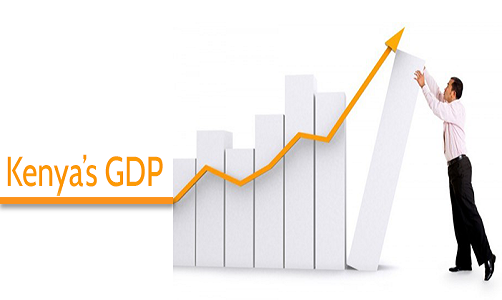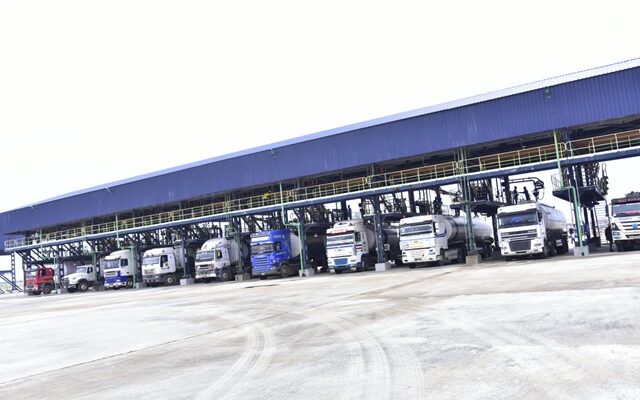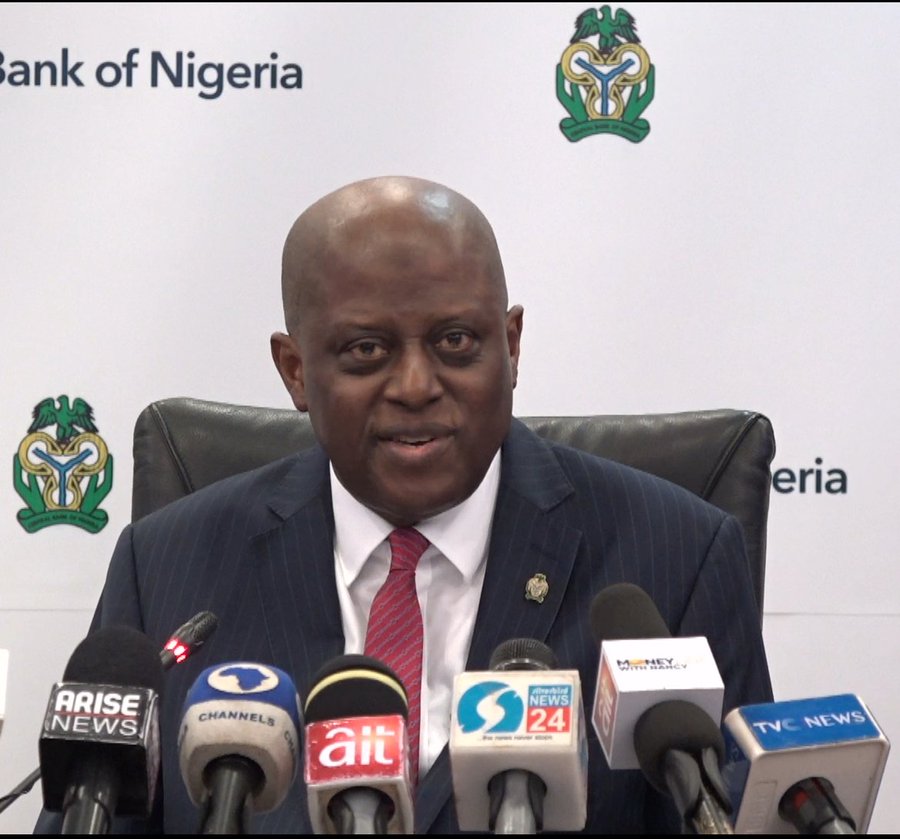Economy
Nigeria Accounts for 90% of Anglophone West Africa’s GDP—Ecobank

By Modupe Gbadeyanka
A new report by the Ecobank Research team has revealed that Nigeria accounts for 90 percent of the Gross Domestic Product (GDP) of Anglophone countries in West Africa.
Anglophone West Africa, which stretches from Gambia in the West to Nigeria in the East, covers six countries; Ghana, Guinea, Liberia, Nigeria, Sierra Leone and The Gambia and encompasses the West African Monetary Zone (WAMZ), which draws together the mostly English-speaking countries of West Africa.
The Ecobank Research team in its newly published Anglophone West Africa section of its flagship financial website, AfricaFICC, said economic forecast for the region looks brighter.
It said Nigeria, Africa’s largest economy, is at last moving out of recession, while Ghana’s growth continues to be strong, and the region’s smaller countries picking up as they shake off the lingering effects of the Ebola outbreak in 2013-16.
The report said the outlook for both Nigeria and Ghana, the second key member of the block, is good in 2018: Nigeria is improving oil production, Ghana is getting a boost from an expansionary 2018 government budget and rising energy production; Guinea, Liberia and Sierra Leone are on the up as their recovery from the effects of Ebola gathers pace; and the positive political outlook in The Gambia is driving economic prospects.
Outside oil and gas, Anglophone West Africa is a major producer of soft commodities – cocoa, cashew nuts, natural rubber and wood – both for regional consumption and for export to world markets.
The region is an important exporter of hard minerals, including gold, diamonds, and manganese, iron and aluminium ores, with Ghana the leading gold producer.
It is also a financial hub, having an estimated 39 percent of Middle Africa’s banking assets in 2015 (mostly in Nigeria). Nigeria and Ghana host two of the largest stock exchanges in Africa, in Lagos and Accra, respectively.
The report said Nigeria has developed the world’s largest sugar refining complex in Lagos, and has successfully phased out imports of packaged and refined sugar.
Regional Executive for Anglophone West Africa & Managing Director of Ecobank Ghana, Dan Sackey, stated that, “West Africa is coming out of a difficult period where it has faced many challenges – recession, Ebola, falling oil and other commodity prices – but we are now back on a growth trajectory.
“The recovery in commodity prices, notably oil and cocoa, has given a boost to economic growth, especially in Nigeria and Ghana, lifting the entire region.
“It is essential that West Africa uses this opportunity to press ahead with the diversification of the economy away from dependence on oil and minerals, with a focus on increasing output and processing of soft commodities, improving logistics and using the region’s financial and stock market leadership. Provided West Africa’s governments can maintain fiscal discipline, the growth outlook is very positive.”
“Ecobank understands regional and local business customs, regulations and country-specific risks better than any other bank in Africa because we operate on the ground in 33 markets,” said Dr Edward George, Ecobank’s Head of Group Research.
“Our new website offers reliable and comprehensive economic, currency, banking, commodity and trade data on markets in Sub-Saharan Africa, helping both us and our clients to make investment and other financial decisions as part of our seamless service,” he said.
Ecobank’s flagship Africa Fixed Income, Currency and Commodities (FICC) on-line resource, https://Ecobank.com/AfricaFICC, provides key facts for businesses and investors on the economies of countries in Sub-Saharan Africa and the key sectors of activity.
The website gives a country-by country analysis, including the general economic outlook, details of the FX, FI and banking sectors, and overview of the energy and soft commodity sectors, as well as of key trade flows.
Economy
Shettima Blames CBN’s FX Intervention for Naira Depreciation

By Adedapo Adesanya
Vice President Kashim Shettima has attributed the Naira’s recent depreciation to the intervention of the Central Bank of Nigeria (CBN) in the foreign exchange (FX) market, stating that the currency could have strengthened to around N1,000 per Dollar within weeks if the apex bank had allowed market forces to prevail.
The local currency has dropped over N8.37 on the Dollar in the last week, as it closed at N1,355.37/$1 on Tuesday at the Nigerian Autonomous Foreign Exchange Market (NAFEM), after it went on a spree late last month and into the early weeks of February.
However, speaking on Tuesday at the Progressive Governors’ Forum (PGF), Renewed Hope Ambassadors Strategic Summit in Abuja, the Nigerian VP said the intervention was to ensure stability.
“In fact, if not for the interventions by the Central Bank of Nigeria yesterday, the 1,000 Naira to a Dollar we are going to attain in weeks, not in months. But for the purpose of market stability, the CBN generously intervened yesterday.
“So, for some of my friends, especially one of our party leaders who takes delight in stockpiling dollars, it is a wake-up call,” the vice president said.
He was alluding to CBN buying US Dollars from the market to slow down the rapid rise of the Naira.
Latest information showed that last week, the apex bank bought about $189.80 million to reduce excess Dollar supply and control how fast the Naira was gaining value.
The move was aimed at preventing foreign portfolio investors from exiting Nigeria’s fixed-income market, as large-scale sell-offs could heighten demand for US Dollars, intensify capital flight, and exert further pressure on the exchange rate.
Amid this, speaking after the 304th meeting of the monetary policy committee (MPC) of the CBN on Tuesday, Governor of the central bank, Mr Yemi Cardoso, said Nigeria’s gross external reserves have risen to $50.45 billion, the highest level in 13 years.
This strengthens the country’s foreign exchange buffers, enhances the apex bank’s capacity to defend the Naira when needed, and boosts investor confidence in the stability of the Nigerian FX market.
Economy
Dangote Refinery Exports 20 million Litres Surplus of PMS

By Aduragbemi Omiyale
Up to 20 million litres in surplus of Premium Motor Spirit (PMS), otherwise known as petrol, is being exported daily by the Dangote Petroleum Refinery and Petrochemicals after supplying about 65 million litres to the domestic market.
Nigeria’s average daily petrol consumption stands at between 50 and 60 million litres, indicating that the refinery’s output exceeds current domestic requirements, marking a decisive break from decades of fuel import dependence and recurrent scarcity.
The president of Dangote Group, Mr Aliko Dangote, speaking in Lagos, while confirming a structured offtake agreement with selected marketers to ensure nationwide distribution and eliminate supply instability, said the structured model was designed to eliminate supply bottlenecks and curb speculative practices that have historically triggered disruptions.
“We have agreed an offtake framework to supply up to 65 million litres daily for the domestic market. Any surplus, estimated at between 15 and 20 million litres, will be exported,” he said.
Under a revised distribution framework endorsed by the Nigerian Midstream and Downstream Petroleum Regulatory Authority, the refinery will channel nationwide supply through major marketing companies, including MRS Oil Nigeria Plc, Nigerian National Petroleum Company Limited Retail (NNPC), 11 plc (Mobil Producing Nigeria), TotalEnergies Marketing Nigeria Plc, Rainoil Limited, Northwest Petroleum & Gas Company Limited, Ardova Plc, Bovas & Company Limited, AA Rano Nigeria Limited, AYM Shafa Limited, Conoil and Masters Energy.
With local refining now exceeding national demand, the country stands to conserve billions of dollars annually in foreign exchange previously spent on petrol imports. Analysts say this would ease pressure on the naira, strengthen external reserves, and improve trade balance stability.
Economy
NECA, CPPE Laud CBN’s 0.50% Interest Rate Cut

By Adedapo Adesanya
The Nigeria Employers’ Consultative Association (NECA) and the Centre for the Promotion of Private Enterprise (CPPE) have separately commended the Central Bank of Nigeria (CBN) for reducing the Monetary Policy Rate (MPR) from 27.0 per cent to 26.5 per cent at its 304th Monetary Policy Committee (MPC) meeting.
In reaction, NECA Director-General, Mr Adewale-Smatt Oyerinde, praised the decision in a statement, noting that the 50 basis-point cut is “a cautious but noteworthy signal” that authorities were responding to sustained pressures on businesses.
He said the marginal reduction might not immediately lower lending rates, but reflected “a gradual shift toward supporting growth without undermining price stability”.
According to him, the overall stance remained tight, with the Cash Reserve Ratio retained at 45 per cent and the liquidity ratio at 30 per cent.
He added that the asymmetric corridor around the MPR was also maintained, reinforcing a cautious monetary approach.
“With a substantial portion of deposits still sterilised, banks’ capacity to expand credit to the real sector may remain constrained in the near term,” he said.
Mr Oyerinde described the move as “a careful balancing act” aimed at moderating inflation without worsening pressures on businesses.
He noted that firms continued to grapple with high operating costs, exchange rate volatility and weakened consumer demand.
“Inflation, particularly in food, energy and transportation, remains a significant challenge to employers and households,” he said.
He stressed that the modest easing must be supported by coordinated fiscal and structural reforms to address supply-side constraints.
Such reforms, he said, should improve infrastructure and enhance productivity across key sectors of the economy.
Mr Oyerinde urged financial institutions to ensure the MPR reduction was gradually reflected in lending conditions for manufacturers and SMEs.
He affirmed that although the MPC had not fully relaxed its tightening stance, the rate cut signalled cautious optimism.
“Sustained improvements in inflation, exchange rate stability and investor confidence will determine scope for further easing that supports growth and employment,” he said.
On its part, the CPPE said the decision reflected improving macroeconomic fundamentals and a cautious shift from aggressive tightening.
The organisation noted that sustained disinflation, stronger external reserves, an improved trade balance and relative exchange-rate stability had created room for monetary easing.
It said the rate cut could boost investor confidence and support private-sector growth, but cautioned that weak monetary transmission might limit its impact on lending rates.
The CPPE identified high cash reserve requirements, elevated lending rates, government borrowing and structural banking costs as major constraints to effective transmission.
The group also stressed the need for fiscal consolidation, citing high public debt, persistent deficits and rising debt-service obligations as risks to macroeconomic stability.
According to the chief executive of CPPE, Mr Muda Yusuf, effective policy coordination and stronger transmission mechanisms were critical to unlocking investment and sustaining growth, lauding the CBN for what he described as a measured and data-driven policy adjustment.
The CPPE boss noted that the easing reflected strengthening macroeconomic performance, declining inflation, growing reserves, improved trade balance and enhanced foreign exchange stability.
Mr Yusuf added that for the benefits of monetary easing to be fully realised, authorities must strengthen transmission to ensure lower lending rates for the real sector and advance credible fiscal consolidation to safeguard stability.
He said that if supported by structural reforms and disciplined fiscal management, the current policy direction could unlock a stronger investment cycle and more durable economic growth.
-

 Feature/OPED6 years ago
Feature/OPED6 years agoDavos was Different this year
-
Travel/Tourism10 years ago
Lagos Seals Western Lodge Hotel In Ikorodu
-

 Showbiz3 years ago
Showbiz3 years agoEstranged Lover Releases Videos of Empress Njamah Bathing
-

 Banking8 years ago
Banking8 years agoSort Codes of GTBank Branches in Nigeria
-

 Economy3 years ago
Economy3 years agoSubsidy Removal: CNG at N130 Per Litre Cheaper Than Petrol—IPMAN
-

 Banking3 years ago
Banking3 years agoSort Codes of UBA Branches in Nigeria
-

 Banking3 years ago
Banking3 years agoFirst Bank Announces Planned Downtime
-

 Sports3 years ago
Sports3 years agoHighest Paid Nigerian Footballer – How Much Do Nigerian Footballers Earn












